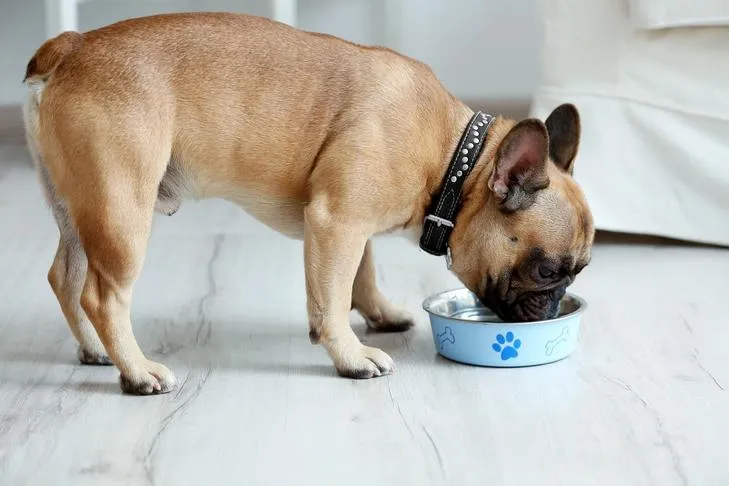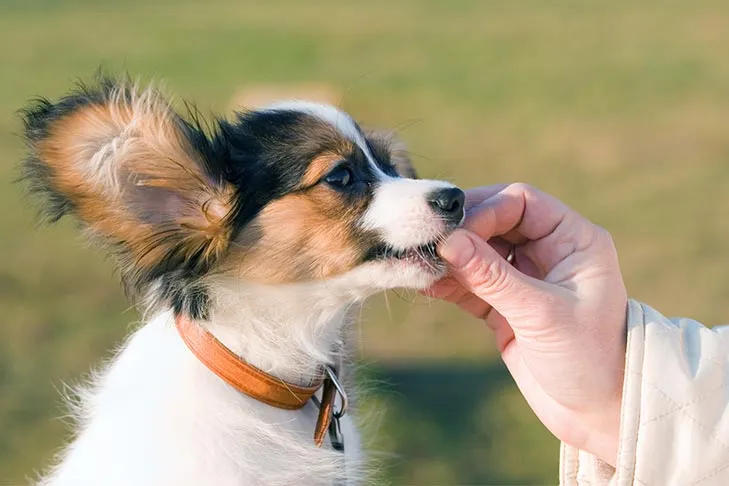As loving dog owners, we often find ourselves sharing every moment with our furry companions, and sometimes that extends to our meals. It’s a common question: “What Can Dogs Eat Human Food?” While it’s tempting to share your plate with those adoring puppy eyes, not all human foods are safe or beneficial for dogs. Understanding which foods are acceptable, and more importantly, how to prepare and serve them, is crucial for your dog’s health and well-being. This comprehensive guide from Dog Care Story will help you navigate the world of human foods that dogs can safely enjoy, offering insights into their nutritional value and necessary precautions.
For a deeper dive into what your canine companion can and cannot consume, exploring trusted resources like our article on Can Dogs Eat What Humans Eat is a great next step. Always remember, moderation and proper preparation are key when introducing any new food into your dog’s diet.
The Benefits of Sharing Certain Human Foods (and How to Do It Right)
Many human foods, when prepared correctly, can offer surprising nutritional benefits for your dog, acting as healthy treats or supplements to their regular diet. From boosting their immune system to improving skin and coat health, certain items from your kitchen can enhance your dog’s overall vitality. However, it’s vital to introduce these foods cautiously and in moderation, always prioritizing plain, unprocessed versions to avoid any harmful additives.
Here’s a breakdown of common human foods that are generally safe for dogs to eat, along with specific guidelines for each:
Bread
Small quantities of plain bread are typically safe for your dog. It offers no significant nutritional benefits, essentially acting as filler, and can quickly add carbohydrates and calories, potentially leading to weight gain if overfed. Always ensure the bread contains no added spices, sweeteners, or harmful ingredients like raisins, which are highly toxic to dogs. Homemade bread is generally a better option than store-bought varieties due to fewer preservatives, but it’s best to consider it an occasional, bland treat rather than a regular dietary component.
Cashews
Cashews can be a healthy snack for dogs, provided they are unsalted and given in very small amounts. These nuts contain beneficial minerals like calcium and magnesium, along with antioxidants and protein. However, despite being lower in fat than some other nuts, consuming too many cashews can contribute to weight gain and potentially lead to gastrointestinal upset. A few unsalted cashews make a nice, occasional reward.
Cheese
Many dogs love cheese, and it can be a good treat in small to moderate quantities. Most dogs are not lactose intolerant, but some can be, so observe your dog for any signs of digestive upset after consumption. When choosing cheese, opt for lower-fat varieties such as cottage cheese or mozzarella to prevent excessive fat intake, which can lead to pancreatitis in some dogs. Additionally, many specialized dog treats made from dried cheese, like Himalayan dog chews, are popular and safe alternatives.
 A curious All American Dog looks at a piece of cheese on the kitchen table, wondering what human food it can eat.
A curious All American Dog looks at a piece of cheese on the kitchen table, wondering what human food it can eat.
Coconut
Coconut, often hailed as a superfood for humans, can also offer benefits for dogs. It contains lauric acid, which possesses antibacterial and antiviral properties, potentially aiding in combating certain infections. Beyond internal consumption, coconut can help improve bad breath and soothe various skin conditions such as hot spots, flea allergies, and general itchy skin when applied topically or consumed in moderation. Coconut milk and coconut oil are also safe for dogs. However, always remove the fibrous outer shell before offering coconut to your dog, as it can pose a choking hazard or cause intestinal blockage if ingested.
Corn
Corn is a common and safe ingredient found in many commercial dog foods, serving as a good source of carbohydrates, protein, and fiber. If you’re sharing corn from your meal, ensure it’s removed from the cob. The cob itself is indigestible and can lead to serious intestinal blockages, requiring veterinary intervention. Always serve plain, cooked corn kernels, free from butter, salt, or other seasonings.
Eggs
Cooked eggs are an excellent, highly digestible source of protein for dogs and can even help settle an upset stomach. They are packed with vitamins, minerals, and amino acids. It is crucial, however, that eggs are always fully cooked. Raw egg whites contain avidin, an enzyme that can interfere with biotin absorption, potentially leading to a biotin deficiency over time. Scrambled, boiled, or poached eggs without any added fats or seasonings are ideal.
For a comprehensive understanding of healthy food options, you might find our article on what foods dogs can eat particularly useful in expanding your knowledge of canine nutrition.
Fish
Certain types of fish can provide a significant health boost for dogs, thanks to their rich content of beneficial fats, particularly omega-3 fatty acids, and high-quality amino acids. Salmon and sardines are especially recommended. Salmon is a powerhouse of vitamins and protein, supporting joint and brain health, while sardines offer easily digestible bones, providing an extra source of calcium. Always ensure fish is fully cooked and cooled before serving. With the exception of small, soft bones in sardines, meticulously remove all tiny bones to prevent choking or internal injury. Limit fish intake to no more than twice a week to avoid mercury accumulation and ensure a balanced diet. Never feed raw or undercooked fish due to the risk of parasites and bacteria.
Ham
While ham is not inherently toxic, it’s not the healthiest choice for dogs. It is typically very high in sodium and fat, which can be detrimental to a dog’s health, potentially leading to pancreatitis or exacerbating existing conditions. Sharing a very small, unseasoned piece as an occasional treat is generally acceptable, but it should not become a regular habit. Always avoid heavily processed, cured, or spiced ham.
 A happy French Bulldog eats from its bowl at home, enjoying its meal which might include dog-safe human food.
A happy French Bulldog eats from its bowl at home, enjoying its meal which might include dog-safe human food.
Honey
Honey is more than just a sweet treat; it’s packed with a myriad of nutrients, including vitamin A, potassium, calcium, magnesium, copper, and powerful antioxidants. For some dogs, small amounts of local honey can even help alleviate seasonal allergies by gradually exposing their immune system to small amounts of pollen, building resistance over time. Beyond consumption, the natural antiseptic properties of honey make it a useful topical treatment for minor burns and superficial cuts on the skin. Always offer honey in very small quantities due to its high sugar content.
Milk
Dogs can drink milk, but caution is advised. While puppies produce lactase, the enzyme needed to digest lactose, many adult dogs experience a decrease in lactase production, making them lactose intolerant. This can lead to digestive upset, including diarrhea, gas, and stomach pain. If you offer milk, do so in very small amounts and monitor your dog for any adverse reactions. Plain water remains the best and safest hydration source for your dog.
Peanut Butter
Unsalted, unsweetened peanut butter can be an excellent source of protein, healthy fats (including heart-healthy monounsaturated fats), and vitamins B and E, as well as niacin. It’s often used to administer medication or as a high-value training treat. However, it is absolutely critical to read the label carefully and ensure the peanut butter does not contain xylitol, a common sugar substitute that is highly toxic and potentially fatal to dogs. Always choose raw, natural peanut butter with minimal ingredients.
Peanuts
Unlike almonds, which are difficult for dogs to digest, plain, unsalted peanuts are safe for dogs in moderation. They offer a good source of healthy fats and protein, contributing to a dog’s energy and overall health. As with all high-fat foods, portion control is essential to prevent excessive fat intake, which can lead to weight gain or more serious conditions like pancreatitis. Avoid salted or seasoned peanuts, as too much sodium is harmful to dogs.
Popcorn
Plain, air-popped popcorn, without butter, salt, or other seasonings, can be a suitable treat for your dog in moderation. It contains riboflavin and thiamine, which are beneficial for eye health and digestion, along with small amounts of iron and protein. Crucially, ensure all kernels are fully popped, as unpopped kernels can pose a significant choking hazard or cause dental damage.
Pork
Pork is a highly digestible protein source, rich in amino acids, making it a valuable addition to some dog diets. While it typically contains more calories per pound than leaner meats, it can be a good option for dogs needing a caloric boost. Furthermore, pork may be less likely to cause allergic reactions in some pets compared to more common proteins like chicken or beef. Always serve cooked, plain pork, trimmed of excess fat and skin, and ensure no bones are present, as cooked bones can splinter and cause internal damage.
Quinoa
Quinoa, a highly nutritious grain, is increasingly being used in high-quality dry dog foods as a healthy alternative to traditional starches like corn, wheat, and soy. Its strong nutritional profile includes protein, fiber, and various vitamins and minerals, making it a beneficial complex carbohydrate for dogs. Cooked, plain quinoa can be added to your dog’s meal in small amounts.
 A fluffy Samoyed puppy rests peacefully in the grass outdoors, enjoying a moment of calm after a healthy meal.
A fluffy Samoyed puppy rests peacefully in the grass outdoors, enjoying a moment of calm after a healthy meal.
Salmon
As previously mentioned, fully cooked salmon is an outstanding source of protein, healthy fats (especially omega-3 fatty acids), and amino acids. These nutrients are vital for promoting joint mobility, supporting brain development and function, and giving your dog’s immune system a robust boost. However, raw or undercooked salmon can be extremely dangerous due to the presence of parasites and bacteria that can cause severe illness, including “salmon poisoning disease,” leading to vomiting, diarrhea, dehydration, and potentially fatal outcomes. Always cook salmon thoroughly to eliminate these risks and ensure it is cooled before serving.
Shrimp
Cooked shrimp, without the shell, tail, head, or legs, can be an occasional healthy treat for your dog. Shrimp are low in fat, calories, and carbohydrates, while being rich in antioxidants, vitamin B-12, and phosphorus. These nutrients support various bodily functions, from energy metabolism to bone health. Always serve shrimp plain, fully cooked, and in moderation to avoid any potential digestive upset, particularly in dogs with sensitive stomachs.
Tuna
In small, controlled amounts, cooked, fresh tuna can be a beneficial addition to your dog’s diet, providing an excellent source of omega-3 fatty acids that support heart and eye health. For canned tuna, it’s essential to offer it sparingly due to its potential mercury content and high sodium levels, which should be avoided in excess. If opting for canned tuna, choose varieties packed in water (not oil) and ensure it contains no added spices or flavorings. A little bit of canned tuna or tuna juice now and then is acceptable as a treat. Consider exploring what foods you can give dogs for more safe options and guidelines.
Turkey
Plain, cooked turkey is a safe and lean protein source for dogs, rich in amino acids essential for muscle development and repair. When preparing turkey for your dog, it’s crucial to remove all excess fat, skin, and especially any bones. Poultry bones can splinter easily during digestion, posing a significant risk of causing internal blockages or even tears in the intestines. Furthermore, never feed your dog turkey that has been seasoned with excessive salt, onions, garlic, or other spices, as these ingredients can be toxic.
Wheat or Grains
Contrary to popular belief, grains are not inherently bad for dogs, and most dogs do not need a grain-free diet unless they have a specific diagnosed allergy. In fact, grains like wheat, corn, and oats are valuable sources of protein, essential fatty acids, and dietary fiber, contributing to a balanced diet and healthy digestion. If your dog has a known grain allergy, your veterinarian will recommend avoiding them. Otherwise, grains can be a healthy component of your dog’s diet. To understand the full spectrum of foods, including both safe and unsafe options, read our guide on what dogs can and cannot eat.
Yogurt
Plain, unsweetened yogurt can be a perfectly acceptable and beneficial snack for dogs. The active bacteria (probiotics) found in yogurt can help strengthen and support a healthy digestive system. However, like milk, some dogs may have difficulty digesting dairy products due to lactose intolerance. Always choose plain yogurt without any added sugars, artificial sweeteners (especially xylitol, which is highly toxic), or fruit flavorings. Greek yogurt, with its lower lactose content, might be a more digestible option for some dogs.
 A small Papillon puppy gently takes a healthy treat from a human hand, illustrating safe ways to share human food with dogs.
A small Papillon puppy gently takes a healthy treat from a human hand, illustrating safe ways to share human food with dogs.
Important Considerations Before Sharing Your Plate
While many human foods are safe for dogs, responsible feeding practices are paramount. Always introduce new foods slowly and in small quantities to monitor for any adverse reactions or allergies. Every dog is unique, and what might be safe for one could cause an upset stomach in another. Moderation is key; human foods should always be considered treats and comprise no more than 10% of your dog’s daily caloric intake.
Never offer seasoned, processed, or fried foods. Stick to plain, cooked, and unseasoned versions. If you have any doubts about a particular food or observe any unusual symptoms after feeding your dog human food, consult your veterinarian immediately. They can provide personalized dietary advice based on your dog’s specific health needs and sensitivities.
A Quick Word on Foods Dogs MUST Avoid
It is just as crucial, if not more so, to be aware of human foods that are highly toxic and dangerous for dogs. Items such as chocolate, grapes and raisins, onions, garlic, avocado, macadamia nuts, and anything containing xylitol (a common artificial sweetener) can cause severe illness, organ damage, or even death. Always keep these foods out of your dog’s reach and consult your veterinarian immediately if you suspect your dog has ingested something harmful. For a detailed list and explanation of these dangerous items, please refer to our essential guide on what human foods dogs cannot eat.
Conclusion
Sharing your food with your beloved canine companion can be a rewarding experience, strengthening your bond and potentially offering nutritional benefits. However, understanding “what can dogs eat human food” safely is a responsibility every dog owner must embrace. By adhering to guidelines for safe foods, proper preparation, and moderation, you can safely enrich your dog’s diet with a variety of healthy human snacks.
Always prioritize your dog’s health by providing a balanced primary diet and treating human foods as supplementary delights. When in doubt, a quick check with your veterinarian is always the safest course of action. Stay informed, stay vigilant, and enjoy the many healthy ways you can share your life, and your plate, with your best friend.
